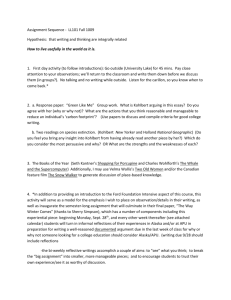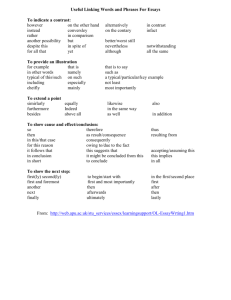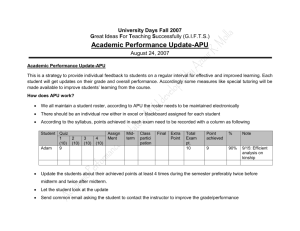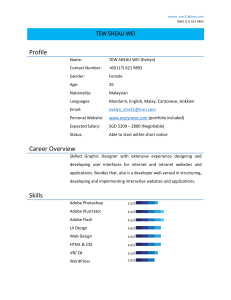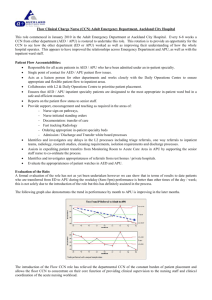Program Guide - Ritsumeikan Asia Pacific University
advertisement
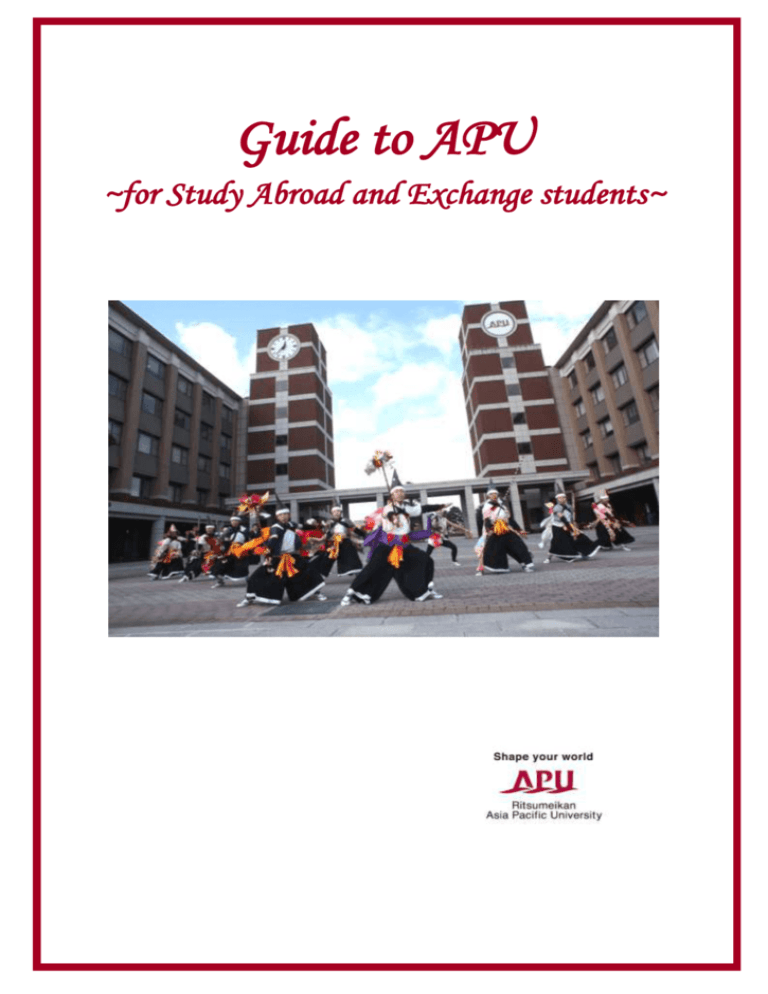
Guide to APU ~for Study Abroad and Exchange students~ 1 A guide for incoming students 1. Message from APU 2 2. Getting to the APU Campus 3 3. Preparation for Departure and Arrival at APU 5 4. Housing 7 5. Studies at APU 9 6. Life at APU and Beppu 13 7. Health and Insurance 16 8. Culture Shock 17 9. Warning: Criminal Behavior and Drugs 19 10. Tips from Past Students 21 11. Helpful Websites 22 1 1 Message from APU こんにちは! Konnichiwa! Congratulations on your acceptance as a Study Abroad/Exchange Student to Ritsumeikan Asia Pacific University (APU). While at APU, you will have the opportunity to experience Japanese language and culture while participating in the truly multi-cultural environment which the APU campus offers. In many ways, you represent your university and Quick APU facts: your home country to the APU community. It is ・ Established in 2000 our opportunity to learn from you at the same time that you are learning from us. We welcome you and hope that your time at APU ・ Nearly 6,000 undergraduate and graduate students ・ 43% are international students from 79 countries (See Student Enrollment by Country/Region) will be an enriching experience. Contact Information Ritsumeikan Asia Pacific University: Address Email TEL FAX Academic Office Ritsumeikan Asia Pacific University 1-1 Jumonjibaru, Beppu, Oita 874-8577 JAPAN inbound@apu.ac.jp From overseas: +81-977-78-1101 In Japan: 0977-78-1101 From overseas: +81-977-78-1102 In Japan: 0977-78-1102 2 2 Getting to the APU Campus The most convenient airports to get to APU from are Fukuoka Airport (International Terminal / Domestic Terminal) or Oita Airport (Domestic Terminal). Highway bus services are available from both airports. You may bring two pieces of luggage(e.g. one suitcase and one carry bag)with you. You might not be allowed to board the airport bus if you have three or more pieces of luggage. Overseas Arrival If you arrive from overseas, you may choose one of the routes below or via other hub airports in Asia. Fukuoka Airport Living Place Narita Airport APU Haneda Airport Oita Airport Kansai Airport Osaka Airport Plane Bus 3 Note: All fees are subject to change. 1. Narita Airport (http://www.narita-airport.jp/en/index.html) If you arrive at Narita Airport, you will need to catch a limousine bus from Narita to Haneda Airport and take a domestic flight to Oita Airport or Fukuoka Airport, or will take a domestic flight directly to Oita Airport. Please note that you must reserve a domestic flight ticket in advance before coming to Japan. *It takes approximately 75 minutes from Narita to Haneda by bus and the fare is 3,100 yen *There are a few direct domestic flights available from Narita Airport to Fukuoka Airport. 2. Kansai International Airport (http://www.kansai-airport.or.jp/en/index.asp) If you arrive at Kansai International Airport, you will need to catch a limousine bus from Kansai to Osaka Itami Airport and take a domestic flight to Oita Airport or Fukuoka Airport. Please note that you must reserve a domestic flight ticket in advance before coming to Japan. *The limousine bus departs from within Kansai Airport. From Kansai Airport to Osaka Airport it takes approximately 80 minutes and the fare is 1,950 yen. *There are a few direct domestic flights available from Kansai Airport to Fukuoka Airport. 3. From Fukuoka Airport (international terminal) to APU (http://www.fuk-ab.co.jp/english/frame_index.html) From the ground floor of the international terminal, take the Non-stop Airport Bus bound for Beppu. Please refer to “3. Arrival Assistance Service” on page 6. 4. From Oita Airport to APU (http://www.oita-airport.jp/en/) Catch the airport Airline Bus bound for Beppu. Please refer to “3.Arrival Assistance Service” on page 6. 4 3 Preparation for Departure and Arrival at APU 1. VISA ACQUISITION (1) Application of the Certificate of Eligibility for a Status of Residence (COE) Before visa application, successful applicants to APU must first obtain a COE from the Japanese Immigration Bureau. APU will apply for the COE on behalf of successful applicants if the following requirements are met: a. Applicants have chosen APU to apply for the COE on their behalf. b. Applicants have paid all the necessary fees by the stipulated deadline. c. Applicants are able to prove they possess sufficient finances for their period of studies and have submitted all the required documents. d. Applicants are deemed appropriate by the University. We usually receive the CoE from Japanese Immigration office approx. 4 weeks after we apply for it. (2) Procedures after obtaining the COE After APU applies and receives the COE on the student's behalf, APU will send the COE to your home university coordinator/Study Abroad Agent with the original Acceptance Letter. After receiving those documents, you are required to apply the Student visa at the Japanese Embassy/Consulate General with the following documents: a. The Certificate of Eligibility for a Status of Residence (COE) b. Acceptance Letter c. Passport d. One Photograph(45mm square) e. Other documents: Documents may differ depending on the country/region you reside. Since some of these documents may take time to be prepared, please contact the Japanese Embassy/Consulate General for further information as early as possible. If you need the COE to be sent directly to you instead of your home university, please provide us with your mailing address and telephone number (make sure to copy your home university coordinator when informing us by email). 1. 2. BOOK FLIGHT You will only be able to check into the accommodation during the arrival days. Academic Calendar is posted on the Academic Office website. Please keep in mind the check-in date and check the Academic Calendar before you book the ticket. If necessary, please arrange for travel insurance yourself. The mandatory National Health Insurance is applied only after you check into dormitory. Please refer to page 17 for details of this insurance. 5 2. 3. ARRIVAL ASSISTANCE SERVICE APU provides a free-of-charge Arrival Assistance Service for new students although students will have to purchase their own bus tickets. Students will be greeted at the airport and directed to buses bound for Beppu city. This service is available at Fukuoka Airport (international terminal only) and Oita Airport. Please note that the last bus leaving Fukuoka Airport is at about 21:30. New enrollees whose arrivals are not in time for the last bus will have to stay one night at a hotel near the airport and head for Beppu city the next morning instead. Please make your own travel arrangements to the accommodation if you intend to arrive outside the Arrival Assistance Service period or use airports other than Oita Airport or Fukuoka Airport. We will inform you the details of arrival assistance service later on. Arrival Assistance Services at Fukuoka Airport (international terminal): 1. Someone representing APU will greet incoming students at the arrival lobby. 2. Assistance with converting currencies into Japanese yen. Some of the foreign currencies accepted include US dollars (USD), Canadian dollars (CAD), Hong Kong dollars (HKD), Singapore dollars (SGD) and New Zealand dollars (NZD). * Banks at the airport are open from 8:00 am to 9:00 pm everyday. If you will arrive at the airport later than 9:00 pm, be sure you have purchased Japanese Yen before you leave your home country. 3. Assistance with purchasing bus tickets, and directions to non-stop buses bound for APU. The one-way ticket costs approx. 3,200 yen. *The assistants will NOT board the non-stop airport buses with the students. 4. Volunteer student staff will greet you at the bus stop in Beppu and accompany you to the accommodation. 5. Students on domestic flights arriving in Fukuoka Airport (domestic terminal) are requested to use the free-of- charge shuttle bus service to go to the international terminal where the arrival assistance service is available. *Please bear in mind that bus tickets and freight charges will be borne by the student. Arrival Assistance Services at Oita Airport: 1. Someone representing APU will greet incoming students at the arrival lobby. 2. Assistance with converting currencies into Japanese yen. The foreign currencies accepted are US dollars (USD), Euros (EUR) and Korean Won (KRW) only. *The foreign exchange is available at the main Information Desk. The opening hours are from 7:00 till about 21:00 when the last flight arrivals. 3. Assistance with purchasing bus tickets, and directions to the Airliner buses bound for Beppu city. The oneway ticket costs approx. 1,500 yen. *The assistants will NOT board the non-stop airport buses with the students. 4. Volunteer student staff will greet you at the bus stop in Beppu and accompany you to the accommodation. *Please bear in mind that bus tickets and freight charges will be borne by the student. 3. 4. EMERGENCY CONTACT If you have any emergencies from the time you land in Japan until you arrive at accommodation, please contact us at the number below: Student Office: +81-977-78-1901 (from outside Japan) 6 0977-78-1901 (within Japan) 4 Housing 1. Oita International House While in the past, all study abroad/exchange students have lived in AP House on campus, there has been a change and adjustments made due to the lack of capacity at AP House. APU has arranged for all Study Abroad/Exchange students to live in Oita International House, an independent student dormitory operated by Oita prefecture. This dormitory is located in downtown Beppu and while it requires a commute to the APU campus, we hope that it will help you integrate into the local community and allow you to explore more of Beppu city and Oita prefecture. Many of the APU students also live in this facility and downtown Beppu so we hope this will allow for more opportunities for exchange students to meet with them too. 2. Facilities in the Rooms (1) Student room : Single room ; 203 , Room for the disabled ; 1 Student rooms are from 3rd to 9th floor. Room for the disabled is on the 1st floor. (2) Common Facilities: Kitchen and Dining room(3~9F), Laundry(3~9F), Lounge(3~9F) (3) Event Facilities: Hall(1F),Conference room(2F),Training room(2F),Japanese-style room(2F),cooking room(2F) (4) Each room is equipped with internet jack (LAN). Cost of Internet access is free. However, Oita International House assume no responsibility whatsoever for any damages resulting from the use of this LAN. Use at your own risk. 7 3. Accommodation Fee There is a non-refundable moving-in fee of 30,000 yen and the monthly rent at Oita International House is 30,000 yen. Utility fees will depend on your usage and may range from 5,000 ~ 6,000 yen. (Unit: Japanese yen) One Semester One Year Non-refundable Moving-in Fee 30,000 30,000 Non-refundable Bedding / Linen 4,000 9,000 Approx.. 4.5months Approx. 10.5months (From mid March 2015 (From mid March 2015 to early of August 2015) to mid February 2016) 131,000 316,000 Approx. 165,000 Approx. 355,000 Rent (30,000 per month) Total We ask that the upfront prepayments be made by bank wire transfer and we will send invoices to students once they are ready. Monthly utility bills will be issued directly to you, and cash is the only acceptable form of payment. 4. Date of Entry to Oita International House (1) Please see Step 8: http://www.apu.ac.jp/academic/page/content0168.html/?version=english (2) Rooms will not be ready for moving-in on an earlier date. 5. Date of Moving out from Oita International House (1) Please check your invoice. * If you stay longer with unavoidable reasons such as academic issues, you will be charged 1,000 JPY per day. 6. Sending Luggage by Post in Advance Oita International House cannot receive your luggage or parcels on behalf of you until your room number is assigned. Your room number is finalized when you check into the Oita International House. If you need to send your personal materials to yourself by post, please ask someone in your country to do that for you. Please note that room numbers must be marked on parcels when receiving. 7. Transportation to APU Residents at Oita International House will commute to APU by taking a local bus. You will need to purchase bus tickets or bus passes for your transportation needs. Cost estimation for transportation (Calculated as 4 class days a week X 16 weeks): Option 1: Bus Coupon with 3 tickets each: 1,000 JPY/ per coupon x 43 sets =43,000 JPY 1 ticket is needed per bus ride. If you choose to go to campus more than 4 times a week, you will need to purchase more bus coupons. Option 2: Bus pass for 4 months: approx. 75,000 JPY You will need to commute to APU campus on the orientation day. APU will purchase triple bus tickets on behalf of you. The fee will be billed with accommodation fees. 8 5 Studies at APU (1) Academic Calendar The APU academic year begins in April. Each year is divided into two semesters, and each semester is comprised of two quarters and a session. April May June July Aug. Sep. Oct. Nov. Spring Semester 1st Quarter 2nd Quarter Dec. Jan. Feb. March Fall Semester Summer 1st Quarter 2nd Quarter Session Winter Session Academic Calendar: http://www.apu.ac.jp/academic/page/content0257.html/ Note: ALL EXCHANGE/STUDY ABROAD students are expected to attend their registered classes and stay until the end of the exam period at APU during the semester. Special exceptions cannot be made for students who leave before exams end. (2) AREAS OF STUDY College of Asia Pacific Studies: The College of Asia Pacific Studies has established 4 areas of study in order to conduct education and research for the development of wide-ranging problem solving ability and specialized know-how of the issues facing the Asia Pacific region. Studies are centered on solid language proficiency and a basic understanding of the diverse cultures, histories, societies, natural environments, and historical conditions of the Asia Pacific region. ・ Environment & Development ・ Hospitality & Tourism ・ International Relations & Peace Studies ・ Culture, Society & Media College of International Management: Based on a foundation of wide-ranging understanding of the diverse societies, cultures and traditions of the Asia Pacific region, the College of International Management has established 4 areas of study in order to develop students with values and social awareness geared toward creating new businesses and cultivate human resources with the drive and creativity to succeed in the dynamic world of business in Asia. ・ Accounting and Finance ・ Marketing ・ Strategic Management and Organization ・ Innovation and Economics 9 (3) INFORMATION FOR STUDY ABROAD/EXCHANGE STUDENTS Study Abroad/Exchange students will be able to take undergraduate courses in the 2011 Curriculum from both the College of Asia Pacific Studies (APS) and the College of International Management (APM). Most courses at APU are offered both in English and Japanese but the actual timetable and list of courses to be offered will only be released a few weeks before the semester. Please read through the information in the table below to learn more about the curriculum at APU. Students are encouraged to look at the course list and syllabi to get an idea of what types of courses are offered at APU. However, it is important to keep in mind that you may not be able to register all the courses you wish to if they are only offered in Japanese, if they are not offered in a particular semester, or if they clash with another course you need to take. Level Exchange Students can only take Undergraduate Courses but can register courses from both colleges, APS and APM. Language of Instruction English and Japanese Number of Hours per Week per 4×95 minutes: Semester-based language course Course 1×95 minutes: Semester-based major course 2×95minutes: Quarter-based major course Number of Weeks of Study 1 semester is 14 weeks (plus 2 weeks of exams). APU runs on a Quarter system (2 Quarters per semester). Required Number of Courses Minimum: 10 credits in one semester (4 to 5 courses) Maximum: No Limit *Although there is no restriction in the maximum number of credits to register, students are recommended not to take more than 20 credits for their quality of learning. *Please note that students must take classes for the whole semester in both quarters. It is not acceptable to register classes only during 1st quarter or only during 2nd quarter. Language Facilities and Support Japanese classes (creditable) for all levels Course Registration Restriction Exchange students may not register 1st year workshop, 3rd year and 4th year “Major Seminar” or “Undergraduate Thesis” courses. Course Registration Period Registration is done on-line after arrival (spaces per class are limited) Course List and Syllabus For the course list, refer to pages 38 – 45 of the Undergraduate Academic Handbook. (Note that actual courses to be offered will only be available in March (for Spring Semester) and September (for Fall Semester). Syllabus Website SP = Spring Semester SP1 = Spring Semester, Quarter 1 SP2 = Spring Semester, Quarter 2 10 FA = Fall Semester FA1 = Fall Semester, Quarter 1 FA2 = Fall Semester, Quarter 2 Not all classes are taught in English. On the syllabus, the course title ends with a code indicating the language of instruction. Any code which starts with an E (such as EA) is for English and any code which starts with a J (such as JA) is for Japanese. If it starts with any other code (e.g., S or F), it is a graduate level course which is not available to exchange students.. Credit system 1 major course = 2 credits; 1 language class = 4 credits APU incorporates the UMAP Credit Transfer Scheme. For European students: APU Credit = 1.923 ECTS Grading system A+ 100 – 90% ; A 89 – 80% ; B 79 – 70%; C 69 – 60%, F Transcripts One free transcript will be sent to your home university coordinator after you complete your exchange at APU. Credit transfer takes place after you have returned to your home university and your APU transcripts have been sent. Please consult your Study Abroad advisor at your home university before departure on the required credits and transfer procedures. Fail Note: Students are responsible for checking with their coordinators and/or advisors of their home universities about any academic requirements set by their home university. (4) INFORMATION ABOUT TAKING LANGUAGE CLASSES (Japanese, English, and Asia Pacific (AP) Languages) Students who are studying at APU on student exchange or short-term study abroad are eligible to register for English, Japanese and Asia Pacific (AP) Language courses. Points of Caution with Regard to Language Courses 1. Study abroad and exchange students register for classes after regular APU students. Accordingly there is a chance that language classes (including Japanese Intermediate and above) may be filled by regular students. When this occurs, you may not be able to register for the course of your choice. 2. It is possible that the timetable of some foundation or major subjects that you wish to take may clash with that of your chosen language course. In this situation you will need to decide which of the two conflicting courses to register. 3. Do not skip classes or stop taking a class part of the way through the semester without discussing it with the class instructor. 4. It is not possible to change course level. Placement tests will be held to determine your level (an oral interview may be held for students taking a Japanese course). 11 Japanese Courses 1. It is not a requirement for you to take Japanese courses. Only students that want to study Japanese should register for these courses. 2. It is not possible to take 2 courses of a different level at the same time. E.g. You cannot register Foundation I and Foundation II in the same semester. 3. The level of Japanese that you have studied at your home institution may not match exactly with the levels that are offered at APU. The levels offered correspond to APU’s own original system. Please take classes at the level in which you have been placed. 日 本 語 4. No exemptions or prerequisite subjects are needed in order to take Foundation Japanese I. The level that you are placed in will be determined by the pre-enrollment questionnaire about Japanese study that you submit and the results of your placement test. TO DO BEFORE COMING: If it is your first time to study Japanese language and you plan to take Japanese classes at APU, you are strongly encouraged to study and learn the Hiragana alphabet prior to coming! Survival Japanese and the Itstsu No Tobira text is available online and students are strongly encouraged to study this if they plan to study Japanese at APU! English Courses 1. Students whose first language is English are not able to register the English language classes. 2. Students whose first language is not English who enter APU as Japanese-basis students and are willing to register for the English course, must make sure to take the placement test. Those who take the placement test will be registered in a course and will not be able to cancel their registration at a later date. 3. Students whose first language is not English who enter APU as English-basis students are only eligible to register the “Languages for Specific Purposes (English for Business Writing, English for Business Presentation, English Project 1, English for Discussion and Debate” courses. Students who wish to register these English courses are required to submit the “English Background Questionnaire” in advance. AP Language Courses Chinese, Korean, Malay/Indonesian, Spanish, Thai and Vietnamese are offered at APU. 1. It is not possible to study your first (native) language. 2. English-basis students must complete or be exempted from “Japanese Foundation I, II, and III” in order to register. Japanese-basis students must complete or be exempted from “Elementary English A and B” in order to register. 12 6 Life at APU and Beppu APU Buddies Students who requested on will be paired with an “APU Buddy” (a Japanese or International student). The buddies will help you navigate your new life at APU and Beppu, help expand your network at APU as well as assist you in finding the information and resources you need for a smooth transition and adjustment to Japanese as well as “APU” culture. Your buddies will: ・ E-mail you before you arrive. Feel free to ask questions about life in APU and Beppu! ・ Provide assistance on Orientation Day Here are some examples of when you can ask your buddies for help: ・ Learning the bus routes and how to ride a bus ・ Shopping at a local supermarket ・ Going to the post office ・ Visiting the Health Clinic on campus or a local hospital ・ Practicing for a Japanese class presentation Bank Account Study Abroad/Exchange students are not required to open a bank account in Japan (except for scholarship recipients) but there will be a bank account guidance session for students who wish to open an account. It will take a couple months before your bank account can be set up. Cell phones It can take a couple months for students to purchase a cell phone as exchange students first need to complete the necessary paperwork to register with Beppu City. Many exchange students get a prepaid package with the Softbank company (initial charge of approximately 10,000 JPY). Other students purchase a B-Mobile sim card and use smart phone applications to contact friends. (http://www.bmobile.ne.jp/sim/index.html). Note that wifi access is very limited in Japan and on the APU campus compared to what you may be accustomed to in your home countries and universities. Clubs There are about 200 clubs (called “circles” in Japan) and societies on campus. This is a great way to get involved on campus! You can visit the Student Office after arrival if you wish to get in touch with a certain circle. Computers and Internet Access If you bring your laptop, you will also be able to access the internet in your room. You will be given a user account and password and information when you check into Oita International House. 13 Electricity Electrical sockets in Japan have two flat pins and electricity is 100 V AC with a 50 to 60 Hz cycle. If you plan to bring electrical equipment, you should make sure it is compatible with Japanese electricity. A travel agent or travel store may be able to assist you. Meals There is no meal plan at APU. During your stay at APU, you will have the option of eating at the APU cafeteria or cooking in the communal kitchens at Oita International House. To eat at the cafeteria, you will need approximately 300 ~ 500 yen for breakfast and 400 – 1000 yen for lunch and dinner. Keep in mind that Japanese portions may be much smaller than what you are accustomed to. You may not be able to buy food you eat at home - bring food or snacks you may miss! Money Matters It is said that Japan is an expensive country; however, located in Beppu, APU has the advantage of being situated in a more reasonably priced area. Transportation is a little expensive with a round trip to downtown Beppu costing approximately 670 yen with discount “triple” tickets which can be bought at the Co-op shop on campus. Japan is a cash-based society and we advise you to have enough cash on hand. Credit cards (VISA, MasterCard, American Express, and JCB) can be used at department stores and major shops; however it can be difficult in small supermarkets and retailers. Checks are not accepted. The Post Office ATMs located on campus let you use overseas-issued cards. (Service Hours: Mon-Fri 9:00-18:00, Sat 9:00-17:00, Sun& National Holidays 9:00-17:00) For a full list of card types accepted, see Japan Post International ATM Service. The Seven Bank ATMS in Seven Eleven Convenience Stores also accept some foreign credit cards. Please note that there will be an extra charge for money transactions The average exchange student spends 50,000 to 60,000 JPY per month. Here is a rough estimation of living costs in Beppu Food/meals 30,000 – 40,000 JPY/month Academic Expenses (per semester) 10,000 – 20,000 JPY/semester Miscellaneous 10,000 JPY Transportation It takes about 30 – 40 minutes by bus from APU to downtown Beppu. The “Triple” (Discount bus tickets) are available at the university co-op store (discount tickets: approximately 670 yen a round trip). 14 for Weather Located on the southern island of Kyushu, Beppu has a mild climate, compared to other parts of Japan. However, you will still be able to experience the full four seasons. The maximum temperature in Beppu is around 35 degrees centigrade and the minimum temperature is around -4 degrees centigrade. August is the hottest month, February being the coldest month of the year. Work (Part-time employment or jobs) Study Abroad/Exchange students are able to work part-time in Japan but it takes a few months to receive your work permit. In order to work, students must apply for a Work Permit. The Academic Office does not offer support for finding work but information is available at the APU Student Office. Please keep in mind that job options may be limited if you do not speak Japanese. Information on part-time jobs is available on bulletin boards, web sites, magazines and the newspaper, but the number is still very limited. Furthermore, most of the jobs available will require you to speak Japanese. Because of this, you should prepare enough financial resources that you can go through school without having to do a part time work. While you can apply for a work permit at immigration in the airport when arriving in Japan, do not apply if you do not intend to work at a part time job or if a scholarship you are receiving prohibits you from having a art time job. If you do not apply when entering Japan, you can apply while in school. Additionally, be careful of the restrictions imposed on students with part time jobs (such as working a maximum of 28 hours per week while school is in session). Students who work without obtaining a work permit, work more than the permitted number of hours, or work in prohibited businesses or industries will be subject to severe punishment in accordance with Japanese law, such as deportation from Japan. 15 7 Health and Insurance 1 Medication: There is a limit on the amount of medicine (painkillers, etc) that you can bring through customs. Persons traveling to Japan carrying prescription and non-prescription medications should consult the nearest Japanese Embassy, or a Japanese Consulate before leaving their country to confirm whether they will be allowed to bring the particular medication into Japan. Helpful website: http://japan.usembassy.gov/e/acs/tacs-medimport.html 2) APU designated Insurance (mandatory for exchange/study abroad students) All International students at APU (including exchange/study abroad students) are required to purchase National Health Insurance and Student’s Comprehensive Renter’s Insurance (CRI) for personal liability. When you present your national health insurance card at a hospital, you will only be responsible for 30% of the cost. Everyone is required by law to join this medical insurance system. Students will be able to apply for this during orientations for new students. The mandatory insurance plans do not cover your travel period before arriving in Japan and after leaving APU when returning home; therefore, ensure to purchase an appropriate insurance to cover your travels. Also feel free to take extra insurance policy if necessary. NHI Coverage Period: Arrival Date – Departure Date CRI Coverage Period: Semester Students: 6 months from arrival date Year Students: March 1 year from arrival date Exchange National Health Insurance Fees Student’s Comprehensive Renter’s Insurance Period (Payment Deadline) Fees (Payment Deadline) 1 semester Approx. 10,000 yen (June 2015) Approx. 3,000 yen (To be paid with accommodation fees) 1 year Approx. 20,000 yen (June 2015) Approx. 5,000 yen (To be paid with accommodation fees) 16 8 Culture Shock By participating in this program, you will have the opportunity to meet new people and experience different things which will allow you to reflect upon or even change how you view the world. We sincerely hope your time at APU and Japan will be an enriching experience. However, you will most likely experience some form of stress sometime during the program as you encounter a new environment, experience fatigue from travel and change in climate, form new relationships, are separated from families and friends and experience culture shock! Your experience may differ from your peers and but this feeling of disorientation is a normal process you will go through as you adjust to a new culture and environment. The model below illustrates the process of cultural adjustment one experiences when in a new culture. The Model of Cultural Adjustment (Source: http://internationaloffice.berkeley.edu/multiple_use/cultural_adjustment.php) Helpful coping strategies: Find ways to relieve stress Do what you do at home or something close to it. Talk and share with somebody about your intercultural experience. Join club activities on campus! Talk to Academic Office staff or your APU buddy Connect with family and friends back home. Get some exercise and stay active! 17 9 Warning: Criminal Behavior and Drugs APU opened in April of 2000 with the cooperation of Oita prefecture and Beppu city, in the form of land grants and approximately JPY 20 billion in assistance to help us build our school. Furthermore, since the opening of the university, many companies, organizations, individuals, governments, Oita Prefecture, Beppu City, and the Ritsumeikan Trust have provided over JPY2.2 billion every year in scholarships for international students, and domestic students are provided with over JPY 800 million yen in loans. This shows us how great the public's expectations are for the growth of APU and all its students. The majority of students have understood this, and worked hard towards their studies and research, extracurricular activities and local exchange activities, leading a fulfilling student life here. Unfortunately, however, it is a fact that there are some students who are involved in nuisance and criminal behavior in the local community. The university is a place to inquire into the truth through study and research; criminal acts and nuisance behavior is not to be tolerated. Nuisance and criminal behavior by APU students are not only a problem for the university and the students who caused the problems but it lowers the reputation of all APU students, and the entire university and then the trust and goodwill until now from the community will be lost. Your student life would not be able to exist without the trust from the local citizens of Beppu city and Oita prefecture. APU respond to nuisance and illegal behavior severely with suspensions, expulsions, and the suspension or cancellation of scholarships according to the following Disciplinary Standards. The university believes that nuisance or illegal behavior is unacceptable; we hope that students will be able to understand the necessity for these responses and help prevent future offenses. [Disciplinary Standards ] Shoplifting ............................................. One Quarter Suspension and One Semester Scholarship Suspension Theft ..................................................... One Quarter Suspension and Scholarship Suspension Nuisance Parking near APU ................. One Quarter Suspension and One Semester Scholarship Suspension Driving Without a License......................One Month Suspension and Scholarship Suspension Drunk Driving ........................................ Expulsion Misuse of Bus Pass .... .... .... ................ One Quarter Suspension Possessing or Using illegal Drugs ........ Expulsion Cheating on Tests, Theses, Reports .... Suspension and Loss of all Credits or Expulsion and Loss of all Credits Violence ................................................ Suspension and Loss of Scholarship or Expulsion Harassment .......................................... Official Warning and Scholarship Suspension or Suspension and Scholarship Suspension The prohibition of marijuana and other illicit drugs In Japan, there have been successive arrests of university students regarding the possession, cultivation, and use of marijuana and other illicit drugs. The criminal actions and dependability of the use of marijuana and illicit drugs can lead to a dreadful failure of student life. At APU there are international students from many countries, it is necessary for students to correctly understand the dangers and the strict punishment for severe crimes in Japan in order for them to understand the mistakes such as the legality in differing countries, the low dangers compared to regular cigarettes and that there is no punishment just for using it. It also necessary to prevent students from coming in contact in having an easy-going feeling and/or a one-time interest in marijuana and illicit drugs. 18 [Criminal actions and dependability of the use of marijuana] 1) Marijuana use and possession carry severe penalties in Japan under the Marijuana Control Law Possession of Marijuana (passing or receiving) –Maximum five years imprisonment Mediating the passing or receiving – Maximum two years imprisonment Sale of Marijuana – Maximum seven years imprisonment Import or Export of Marijuana – Maximum seven years imprisonment Import or Export of Marijuana for the purpose of sales – maximum ten years imprisonment In addition to any applicable criminal penalties, any students found possessing or using marijuana will face expulsion from APU, and international students face the additional penalty of forced expulsion from Japan with a lifetime prohibition from entering Japan. 2) Dependability You lose your ability to stop using it and the quantity you use increases as well as the frequency of use. Effects on the body There is 50% more tar in marijuana than regular cigarettes, which cause paranasal sinusitis, bronchitis pulmonary emphysema, and cancer of the lungs. Damage to reproductive competence can cause abnormal genes/sudden mutation, and marijuana poisoning of the fetus, miscarriage/still-birth when pregnant. It can also cause profound mental handicap, including a sudden decline in memory, consciousness disorder, hallucinations and delusions due to injury to brain cells. Mental Effects As first there is emotional uneasiness, decline in concentration and patience as well as a decline in energy and self initiative. Gradually, hallucinations and delusions arise, and then symptoms of depression and paranoia set in. Depending on the ingestion of marijuana there is a strong influence for these mental disorders to become what is generally known as marijuana illness. 19 10 Tips from Past Students 【Practical tips】 ・ Save a lot of money because going anywhere is expensive. ・ Bring money to tide you through the first 2 months; you won't be able to remit until then. ・ Take enough cash with you in case the ATM on Campus doesn't accept your card. ・ Things to bring: Bedding, sheets and blankets are provided in Oita International House. Things such as towels, cooking pots and pans, and utensils are not provided but the 100 yen stores in Japan have good products at a very reasonable price! Other things you may want to bring (or buy upon arrival)… It is hard to find healthy food here on campus, so bring something with you (or have sent from home) if you think you will want to eat something that you are used to. Do not bring anything heavy - most necessary things can be bought in 100 yen shop. If you like a specific sport, you might want to bring the equipment to APU. (Ie. Soccer, if you plan to play freely.) If not, you can just play with others and meet friends that way. Either way, sports, music, and art are great ways to make friends. Also, bring your musical instrument, most likely it will be more expensive in Japan. A raincoat (June and July is the rainy season in Japan) Bring a windbreaker because the weather can be very extreme. Good walking shoes and Indoor shoes (Those who would like to use the gym must bring indoor gym shoes that have never been worn outside.) Bring comfortable shoes because there is a lot of walking and stair-climbing to do. Digital camera Souvenirs and/or pictures from your home country to share with the people you meet! ・ Buy triple-tickets (discount bus tickets to go to downtown Beppu) ・ Be mentally prepared that you will have only very limited wifi. ・ It will take quite a while before you get a cell phone, Wifi is only provided in certain places on campus, be prepared for that. ・ Be sure to get informed about the course registration system and procedures. 【Japanese language】 ・ Practice the basics of Japanese before coming. ・ Start learning hiragana and katakana as soon as you are accepted for the program, even if it is confusing and does not make any sense. Learning to match them up will help in the long run. 【Getting involved and Perspective】 ・ Be open-minded, accepting, and have fun. 20 ・ Most of the time, things will not work out or be the way you expect it to be. Some things will amaze you and others might disappoint you, but keep an open mind. When you get to APU, talk to people!! ・ Try as much as is offered, and come to all the different circles to try at least once! ・ Exchange problems with other exchange students ・ If you want an international experience and know more than one language (or are learning a new language), APU is a good place for that. If you are looking specifically for Japanese culture or a very Japanese atmosphere, elsewhere may be best. ・ Be the first person to approach new friends. You will find your university life here in APU is full of surprise. ・ Be patient and positive ・ Try to get in touch with the Japanese culture and people as much as possible, despite the linguistic and cultural barriers. It would be a huge mistake to stay focused on friends from our country for the whole time! ・ I would say just to remember you are in Japan, not your own country so try your best to try Japanese customs and social etiquette… it will make your trip bett 21 11 Helpful Websites Read and research about life in APU, Beppu and Japan to better prepare yourself before coming! Here are some helpful links to get you started… APU Academic Office http://www.apu.ac.jp/academic/ Websites about Beppu http://www.beppu-navi.jp/ http://english.beppu-navi.jp/abord/ http://www.city.beppu.oita.jp/ http://www.beppuftio.blogspot.jp/ Traveling in Japan and Japanese Etiquette www.jnto.go.jp http://www.lonelyplanet.com/japan http://www.japan-guide.com/ Ministry of Foreign Affairs & List of Embassies/Consulates in Japan http://www.mofa.go.jp/about/emb_cons/protocol/a-h.html 22
